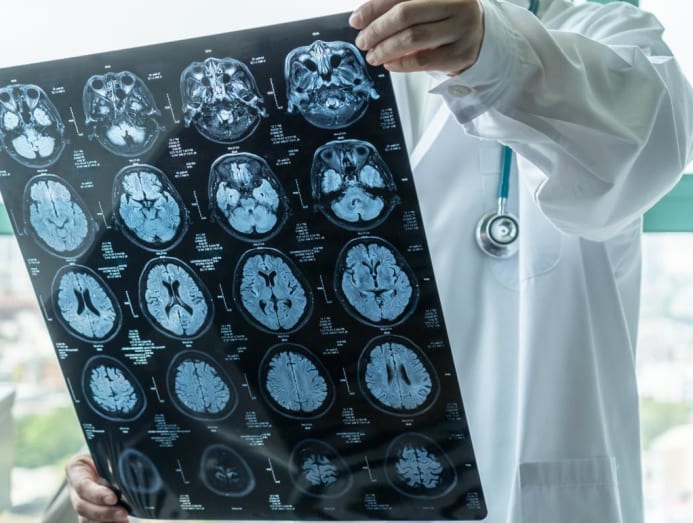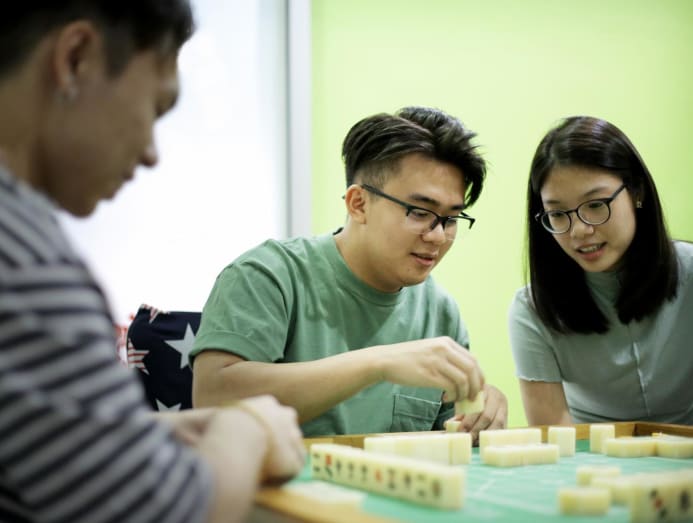How likely are you to develop Alzheimer's disease if your family has a history of dementia?
This World Alzheimer’s Day (Sep 21), find out how your genes and lifestyle factors such as playing mahjong, doing squats (you read right), sleeping enough and good dental health can protect your brain from degenerative diseases.

Neurological diseases such as dementia are the fifth leading cause of disability in Singapore. (Photo: iStock/imtmphoto)
As someone whose late grandmothers (both maternal and paternal) developed dementia in their later years, and has a parent I suspect is on the cusp of brain degeneration (but is yet to be diagnosed), I worry about my own mental health.
The question, “do I have dementia?”, pops into my mind whenever I walk into a room and forget what it is I needed to do. I feel my face turning tomato-red each time I fumble to find the right words in a conversation. I can’t Math when the bill comes and I need to split it more than two ways.
Dementia is a general term that encompasses a wide range of symptoms, including the memory decline, changes in thinking skills, language and behaviour, poor judgment and decreased focus that affect a person’s ability to independently perform daily tasks.
Alzheimer’s disease, on the other hand, is a specific brain disease and is the most common type of dementia. It is marked by abnormal proteins that tangle or clump into plaques within and between neurons. As the neurons die, the brain shrinks, starting in the hippocampus, which is responsible for learning and memory.

The other common types of dementia, according to Alzheimer’s Disease International, include vascular dementia, dementia with Lewy bodies and fronto-temporal dementia.
The statistics aren’t encouraging. Neurological diseases such as dementia are the fifth leading cause of disability in Singapore. One in 10 people aged 60 and above has dementia, according to a 2015 study by the Institute of Mental Health. Already, over 100,000 people have dementia in Singapore and that number is expected to rise to 152,000 by 2030.
But there might be light at the end of the tunnel. “A growing body of evidence supports 12 risk factors that account for around 40 per cent of worldwide dementias, which consequently, could theoretically be prevented or delayed,” said Associate Professor Ng Kok Pin, a senior consultant with National Neuroscience Institute’s (NNI) Department of Neurology, who listed them (not in any specific order) as:
- Diabetes
- Hypertension
- Depression
- Smoking
- Obesity
- Traumatic brain injury
- Hearing impairment
- Excessive alcohol consumption
- Physical inactivity
- Low social contact
- Less education
- Air pollution

IS THERE ANY GENETIC LINK?
Other than the external factors that Assoc Prof Ng mentioned, need I worry, given my family’s history as well as my lapses in memory, focus and ability to do mental sums?
Let’s start with Alzheimer’s disease, the most common form of dementia. What are my odds?
“If your parent is diagnosed with Alzheimer’s beyond 65 years old, there is a low likelihood of genetic inheritance (less than 5 per cent chance). And you ought to maintain your physical, emotional and cognitive health to prevent dementia,” said Dr Noorhazlina Binte Ali, a geriatrician and senior consultant at Tan Tock Seng Hospital’s Department of Geriatric Medicine.
I did some digging online and found this on the UK’s Alzheimer’s Society website: “If one parent has a familial gene, their child will have a one in two chance of inheriting it and developing dementia – usually when they are in their 50s and 60s”. The website qualified that familial genes are very rare for most types of dementia.
“However, these genes may be the cause of around one in three cases of fronto-temporal dementia,” the website said.
Related:
There’s also young onset dementia to worry about. This refers to any type of dementia that develops in those below the age of 65. “We’ve seen an increase in persons being diagnosed with young onset dementia in the past few years,” said Dr Noorhazlina, who is also a board member of Dementia Singapore. “More than 100 individuals are diagnosed with young onset dementia at the NNI every year.”
Again, genes are involved in this form of dementia, specifically the mutation of certain genes, said Dr Noorhazlina, and it can be “inherited within a family”. One such gene is apolipoprotein E (APOE), according to Alzheimer’s Society.
Certain variants of this gene can increase a person’s risk of developing Alzheimer’s disease by up to four times – and it can begin as early as age 30. The upside is, it is rare and accounts for less than 5 per cent of Alzheimer’s cases, said Dr Noorhazlina.

AGE AND DEMENTIA
It is important to note that dementia is not a normal part of ageing – although getting older can increase your risk.
The age-related link comes from the fact that the diseases that damage the brain, such as Alzheimer’s disease and vascular disease, can take a long time to develop, according to Alzheimer’s Society. On average, you roughly double your risk every five years, noted the website.
For example, around two in every 100 people have dementia for those aged between 65 and 69. But among those aged over 90, around 33 in every 100 people have dementia.
It also doesn’t help when the older you get, the more likely you are to get health issues such as high blood pressure and a higher risk of stroke, among other medical factors, that can increase your dementia risk.
TACKLING MODIFIABLE RISKS
Other than the aforementioned 12 risk factors, I also couldn’t help but wonder about the other lifestyle factors I’ve read about that could potentially affect the brains of middle-agers like myself.
For instance, can missing out on sleep and using sleeping pills affect my risk profile? Should I join the aunties who have jio me to play mahjong? And what is it about squats being a brain-boosting move my colleague told me about (“I don’t know how squats help mentally but I have a perkier butt!”)? I haven’t even got to flossing when I caught sight of an article about acid reflux medication increasing my risk of dementia.
Should you pay mind to them? Read on to find out.
- PERFORM SQUATS

Experts such as Dr Silky Singh Pahlajani, a clinical professor of behavioural neurology and neuropsychiatry at Weill Cornell Medicine, basically called exercise a brain buffer for dementia. On CNBC’s website, Dr Pahlajani “always tell my patients, what’s good for the heart is good for the brain”.
But rather than the usual cardio-type exercises that get your heart pumping (running, cycling or swimming), squats have entered the group chat. At least in Dr Michael Mosley’s podcast Just One Thing. So, why squats?
According to Damian Bailey, a professor of physiology and biochemistry at University of South Wales' Neurovascular Research Unit, squats are an “intelligent” form of exercise because you are “intermittently challenging the brain with an increase of blood flow and a decrease in blood flow”. "This to-ing and fro-ing from high-flow to low-flow challenges the inner lining of the arteries that supply blood to the brain."
And you certainly need a boost in blood flow to your noggin because as you age, the hippocampus tends to shrink and receive less blood flow, said Prof Bailey, which has been linked to cognitive decline and the neurodegenerations associated with Alzheimer’s disease.
To boost your brain (and butt) – and is less strenuous than a 30-minute walk or run – Prof Bailey recommended three to five minutes of squats three times a week.
- RETHINK ACID REFLUX MEDICATION

If, like me, you’ve been taking proton pump inhibitors to reduce the stomach acid activity that’s otherwise causing a whole lot of issues such as heartburn, ulcers or gastroesophageal reflux disease, this study might give you pause.
Published in the August 2023 issue of Neurology, the study found that individuals who took proton pump inhibitors for 4.5 years or more may have a 33-per-cent higher risk of dementia compared to people who aren’t on the medication.
More than 5,700 people aged 45 and older, who did not have dementia at the start of the study, were tracked by the researchers for over five years. They were divided into four groups: Those who aren’t on the medication; and those who took the medication for 2.8 years, 2.8 to 4.4 years, and more than 4.4 years.
“While we did not find a link with short-term use, we did find a higher risk of dementia associated with long-term use of these drugs,” said study author Professor Kamakshi Lakshminarayan of the University of Minnesota School of Public Health in Minneapolis, US. "More research is needed to confirm our findings and explore reasons for the possible link between long-term proton pump inhibitor use and a higher risk of dementia.”
If you’re concerned about your heartburn meds, have a word with your doctor. Or do what Prof Lakshminarayan suggested: Take antacids instead, maintain a healthy weight and avoid late meals and foods that cause your acid activity to act up.
- PLAY MAHJONG

Mild cognitive impairment (problems with memory, focus and learning) affects 10 per cent to 20 per cent of those above 65 years old – and about 10 per cent of them progress to Alzheimer’s disease each year, according to this study.
But what can potentially turn things around at this mild stage is to, I’m glad to say, play mahjong. The same study recruited 56 participants – aged 65 years and above and all with mild cognitive impairment – from a nursing home in Sichuan, China. They played mahjong three times a week for an hour each time for 12 weeks. The seniors were then put through a number-connection test and questionnaire to assess their independence when it comes to daily activities.
Even as early as the sixth week, the mahjong group had already shown a small but steady increase in their scores compared to the control group. By the end of the 12 weeks, the mahjong players’ scores were “significantly improved”.
“In mahjong, players are required to maintain acute attention, a robust memory and sharp mental calculations. The thrill of winning a game further enhances these skills in a positive manner,” said psychiatrist Dr Lim Boon Leng of Gleneagles Hospital’s Dr BL Lim Centre For Psychological Wellness. “This mirrors the principles of mental exercise, contributing to the reinforcement and strengthening of cognitive abilities.”

The social aspect of playing with three other players is another win for your brain. “It is believed that mental activity and socialisation protect against cognitive decline and dementia through improving brain resilience,” said Associate Professor Christopher Chen, a visiting consultant with National University Hospital’s Department of Psychological Medicine.
“Over time, through a process called neuroplasticity, your brain can change to reinforce the skills learnt and cope with the changes brought on by disease,” he said. “In general, I advise people to take part in mental games that are engaging and challenging. Passive activities (such as watching TV) may not provide the same brain benefits.”
And it’s not just mahjong. Dr Lim also recommends chess, card games and even bingo. If you can’t round up enough friends to “open a table” in mahjong speak, solo mental games such as Sudoku and crossword puzzles are good, too – though you’ll miss out on the socialising you get from playing with friends.
- GET ENOUGH SLEEP

Sleeping enough doesn’t just keep you from dozing off in the day, but also “rinses out” dementia-causing toxins from your brain, according to researchers. In fact, if you have insomnia or sleep-related problems such as altered sleep duration and sleep fragmentation, you may run a higher risk of Alzheimer’s disease, said Assoc Prof Ng.
It was reported in a review article that approximately two-thirds of Alzheimer’s disease patients have “sleep-related problems such as frequent daytime napping, night-time wakefulness and sundowning (agitation and disruptive behaviours that occur in the evening or night)”, he said.
So, we may resort to sleep aids such as white noise machines, sleep-tracking games and melatonin supplements. Those who need stronger stuff may take prescriptive sleeping pills such as benzodiazepines (you may know them as Clobazam, Clonazepam, Diazepam, Lorazepam, Nitrazepam or Xanax).
But “there exists a link between sleeping pills and dementia”, “although a definitive causal relationship has not been established,” said Dr Lim, citing an editorial published in The American Journal Of Psychiatry.
Rather than relying on sleeping pills, Dr Lim advised to resolve the root cause of your insomnia first. “Oftentimes, insomnia stems from the fear of not being able to sleep and can also result from various other psychiatric or medical conditions. Cognitive behavioural therapy tailored for insomnia stands as an effective means to elevate sleep quality.”
- BRUSH AND FLOSS YOUR TEETH

Good dental health doesn’t only save you money at your twice-yearly dental visits (you haven’t missed your appointments, have you?), it can apparently also reduce your risk of Alzheimer’s disease.
There is “more emerging evidence” indicating that the bacteria that causes dental plaque and periodontal diseases (such as gingivitis and periodontitis) could play a role in “the development and progression of dementia, in particular, Alzheimer’s disease”, said Dr Jacinta Lu, the clinical lead and a consultant with Department of Periodontics, National University Centre for Oral Health, Singapore.
“Evidence from in-vitro, animal model and human studies support the role of bacteria from the periodontal biofilm and their toxins and enzymes as an upstream event in the initiation and progression of Alzheimer’s disease,” said Dr Lu.
This oral bacteria can penetrate the blood-brain barrier and thereafter, “they can either directly or indirectly help promote breakdown of healthy brain tissues or interfere with the function of the neurons of susceptible individuals”, said Dr Lu.

If you’re still not convinced to brush and floss twice daily, researchers have found “an increased prevalence of periodontitis amongst persons with dementia”, said Dr Yang Jingrong, the head of Geriatric Special Care Dentistry Clinic, Department of Restorative Dentistry at National Dental Centre Singapore (NDCS).
“However, there is much debate on whether the association is causal or casual,” said Dr Yang, who is also a consultant with Periodontics Unit, Department of Restorative Dentistry at NDCS. “Most long-term studies are less than 10 years and it takes 10 years or more to measure cognitive decline as an outcome.
“Nonetheless, it has been shown that periodontal disease presents with increased levels of inflammatory disease that leads to the aggravation of dementia, in particular, vascular dementia. Within this context, periodontal disease may affect individuals vulnerable to dementia and contribute to its onset,” she said.








